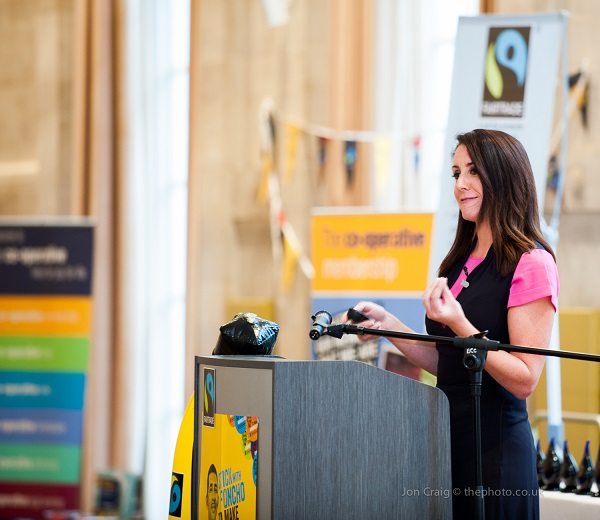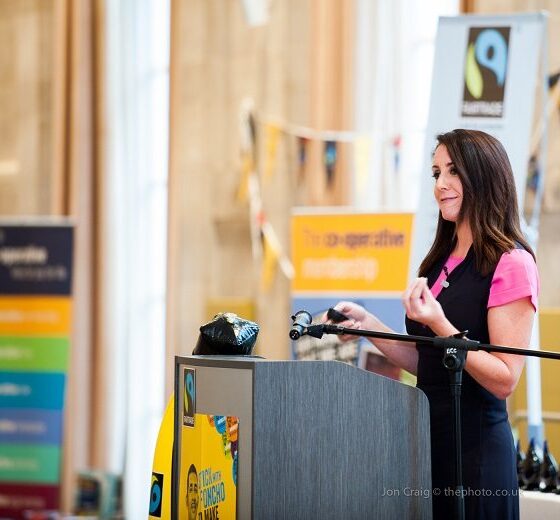

Economy
20 questions with… Lucy Siegle
Lucy Siegle answers 20 questions on life, sustainability and everything.
A columnist with the Guardian and Observer and reporter on programmes like The One Show and Radio 4’s From Our Own Correspondent, Siegle is the brains behind the acclaimed Observer Ethical Awards, which took place last week in London.
She was appointed a visiting professor in sustainable and ethical fashion at University of the Arts London in 2008 and is the author of three books, most recently 2010’s To Die for: Is Fashion Wearing Out the World?
We want the world to be as blue and green tomorrow as it was yesterday. What’s your mission?
To convince everybody they have a vested interest in fighting for the environment – however disenfranchised they feel.
When you were a child, what did you want to be when you grew up?
At five I told my mum I wanted to be a dinner lady – I liked the tabard. Then I wanted to be in a symphony orchestra as I was very musical. Now, I have a dream of working for the Falmouth coastguard. I filmed there and it was pretty cool. They have co-ordinated rescues from every corner of the globe. They have an obligation to rescue British subjects carrying their distress device from anywhere in the world. That is an incredible responsibility. They are under threat from budget cuts. One day I’ll grow up…
How would your friends describe you?
Depends which ones you ask. Bossy (even on holiday) but very loyal.
What was your ‘road to Damascus moment’ in terms of sustainability?
It was more of a drip, drip, drip effect! Having been brought up to really love the natural world and think about resource use – especially through my grandad who was from a working class background in Bootle, Liverpool (proving that it’s nonsense that eco issues are only for wealthy or landed gentry) – I’d let it all slip.
I had friends who were much more politicised when I was about 16/17 and part of the rave/reclaim the streets movement and learned a lot about anti-corporate politics. Then of course there was No Logo. Ultimately however I found it all a bit hairy hippie until I saw businesses who were trying to normalise different ways of doing things: Neal’s Yard, Riverford, that sort of thing. I realised I could use my skills as a journalist/writer to pursue things I really cared about.
Who or what inspires you?
Last Wednesday was the Observer Ethical Awards so I have a long list of people who inspire me. I found many of the shortlisted entrants incredible especially Anne Power, a protestor who at 82 is one of the figureheads at the Barton Moss campaign, loves the ‘wit and energy’ of the younger campaigners. Frank Hewetson of Greenpeace, one of the so-called Arctic 30, spoke and was particularly inspiring.
Those guys have an extraordinary amount of responsibility on their shoulders, taking idealistic protestors into increasingly dangerous confrontations. I admire their judgement and courage. I have so much respect for people who make stuff with love and care and attention. (See my favourite quote below!).
What really grinds your gears?
Proselytising idiots who can’t see the bigger picture – especially green ones. People who don’t understand the role of impartiality in journalism or the importance of mainstreaming. They set environmental causes back by about 100 years.
Describe your perfect day.
A run, and a bit of South Devon beach. Lots of food. I spend many of my days in this way.
What do you see when you look out your window at home?
Well the other day I swear I saw the end of a weasel’s tail. I have also found weasel droppings on a bird table. I am totally obsessed. But mostly my home is my sister’s home in South London. Mainly squirrels and roses.
What do you like spending your money on?
What money? Really well-made clothes. These are my downfall.
What’s your favourite holiday destination?
I just went to Iceland for work – amazing work – to interview Bjork. Now I want to go and see the plate tectonics shift at Thingvellir.
What’s your favourite book?
Portrait of the Artist As A Young Man by James Joyce. I grew up four doors down from one of Joyce’s many houses in Bray, Wicklow, where the Christmas dinner scene is set.
What’s your favourite film?
Goodfellas. It’s brilliant.
You’re made prime minister. What’s the first thing you do?
Hand over to someone more strategic. I don’t like politics.
If you were stuck on a desert island, which famous person would you like to be stuck with and why?
I think Ray Mears would be helpful.
What was the best piece of advice you have ever been given? And the worst?
I love unnecessary advice. When I was moving to London to university as one of the squarest teenagers anybody has ever met, a friend of my parents rushed around to warn me I must never get into crack cocaine. I’ve always found that hilarious.
What would you like to be doing five years from now?
I don’t do plans unless it’s for clothes; I don’t buy anything that I can’t commit to wearing at least 30 times.
What’s your biggest regret?
I would’ve loved to have edited a really cool, mainstream sustainability publication. Was on the verge, but then came the financial crisis!
What one thing would you encourage readers to do to make their life more sustainable?
Compost. It’s a gateway to all sorts of behavioural change.
What’s the one idea that you think could change the world for the better?
I think the circular economy has enormous potential. But I also really liked the idea of personal carbon budgets – that died a death.
What’s your favourite quote?
Wendell Berry’s warning to us all. I take it very seriously and it informs a lot of what I do, including a shop, Siegle & Co, that my husband set up to sell the work of real craftsmen and reinstate the links between producer and consumer.
“The global economy institutionalises a global ignorance, in which producers and consumer cannot know or care about one another, and in which the histories of all products will be lost. In such a circumstance, the degradation of products and places, producers and consumers is inevitable.”
Lucy Siegle is a journalist focusing on the environment, sustainability and ethics, and is the founder of the Observer Ethical Awards.
Photo: Jon Craig photography, taken at the South West Fairtrade Business Awards 2014
Further reading:
Brian May among winners at Observer Ethical Awards 2014
Observer Ethical Awards 2014: a look inside the ‘green Oscars’
The Observer announces shortlist for 2014 Ethical Awards
Fashion Revolution Day to promote supply chain issues on Rana Plaza anniversary


 Environment12 months ago
Environment12 months agoAre Polymer Banknotes: an Eco-Friendly Trend or a Groundswell?

 Features11 months ago
Features11 months agoEco-Friendly Cryptocurrencies: Sustainable Investment Choices

 Features12 months ago
Features12 months agoEco-Friendly Crypto Traders Must Find the Right Exchange

 Energy11 months ago
Energy11 months agoThe Growing Role of Solar Panels in Ireland’s Energy Future




























